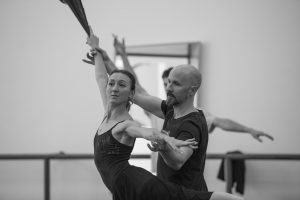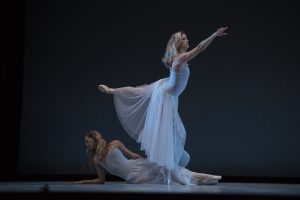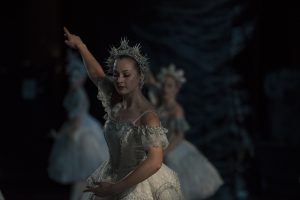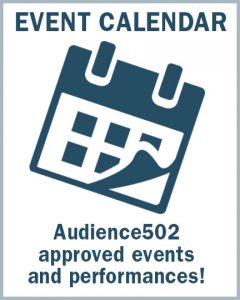 The Louisville Ballet was founded in March 1952 and is now recognized as one of the most highly-regarded regional ballet companies in the country.
The Louisville Ballet was founded in March 1952 and is now recognized as one of the most highly-regarded regional ballet companies in the country.
As the official state ballet of Kentucky, it has hosted some of ballet’s biggest names, including Mikhail Baryshnikov, Twyla Tharp and Wendy Whelan, performed for over tens of thousands of people, and reached more than 20,000 school-age children through its educational programming.
Audience Publisher, Douglas Dreisbach, caught up with Artistic Director, Robert Curran, about how the team at the ballet is coping with the current crisis and what we can expect in the company’s 2020-21 season. This interview was also featured in the April edition of Audience Magazine.
Douglas Dreisbach: How are you and everyone at the Louisville Ballet doing?
Robert Curran: We are managing the same as everybody else. We are meeting and communicating as often as we can and trying to stay positive while really taking a look at the harsh reality of what the world is facing right now and prioritizing where we can.
DD: With everything going on, how have priorities changed at the Louisville Ballet?
RC: I don’t think the priorities have changed, as we have always had a focus on how we serve our community in the broadest possible sense. I feel it is important for our community, and indeed the entire world, to be looking forward to better times, and we can facilitate those better times as an art sector. I also feel priorities exist in our Louisville Ballet School. Across all of our programs, we’re asking, “What do virtual classes look like?” “How do we keep communication with our dancers?” “How do we keep them moving at a time where we’re very, very isolated?” Those are priorities right now.
The same thing goes for our community engagement, in a more broad sense. How can we continue to serve the populations that we serve through our community engagement programs? We are looking very hard at how we message, what we talk about, how we stay positive, and how we continue to deliver the all-important art experience to our community.
DD: Since stages went dark, we have realized just how important the arts were in our lives and how much we miss it. Why do the arts play such a key role in our community?
RC: Even before this new paradigm, the arts were incredibly important because it’s storytelling. We all need storytelling to make us feel less alone. When we can experience another person’s story, and connect with that story in some way, and learn and grow and get strength or knowledge from that experience of somebody else’s story, we can become better people. We become a better community when we can understand each other better and also feel less alone, feel less afraid, feel less isolated. And that was before this new paradigm, where we’re even more isolated. I feel like the arts, right now, are vital in that storytelling, creating that opportunity for empathy, where we can appreciate, understand, respect and love each other’s stories, so that we can be a stronger community.
 DD: How have you seen some of your team and others staying positive, being creative, being inspired to maybe try something new or to stay in a good mental place?
DD: How have you seen some of your team and others staying positive, being creative, being inspired to maybe try something new or to stay in a good mental place?
RC: The dancers are sharing some fantastic stories with us. A lot of them are diving into projects they wouldn’t normally have the time to do. One of our dancers has started regularly investing in training his dog with as many new tricks as he possibly can. The dancers are an incredibly creative bunch, and all of that creativity now is seeping out of them in new ways.
What I am most proud of, in terms of the Louisville Ballet family, is their resilience. These are incredibly challenging times. We are not operating, in any way, shape, or form, like we normally do and the level of comfort we once had is gone. But the staff, the administration, the artists, the creators and all of their resilience has just been an inspiration to me and to each other during these uncertain times.
DD: What are your plans for announcing the 2020-2021 season?
RC: We are intending to launch a season, no doubt. That’s a definite. But what is the right time to do that? And in doing that, how are we serving our community? When is the right time? Is our season rising to the top of people’s priority levels? Or is launching a season at a particular time insensitive when people are focused on their health and their family’s health and mitigating the spread of this virus? It may not be an appropriate time for us to put out a season.
We’re wanting to be really sensitive to changes that are happening daily and listening to our community and trying to give them what they need, whether that be space and time, or whether that be hope and looking forward to recovering from this challenging time. That’s a decision that fluctuates on a daily basis, but rest assured, everybody at the ballet is working on a season that is going to be hopefully what this community needs to recover and to get back to our new normal.
DD: A lot of people need help in different ways right now. What is the best way people can support the Louisville Ballet and your team during these times?
RC: Fundraising is a huge challenge right now. Our board is doing fantastic work in fundraising to sustain the ballet, but of course, if you are adequately resourced, we would certainly welcome any support that you could give us right now to make sure that we can continue to serve our community. Another thing I would love for patrons, donors, arts lovers, to do is engage with us. Talk with us. Get on our social media. Let us know that you’re OK. Let us know what you need. Let us know what you love about the ballet. Let us know what you love about the art sector. Just get involved with the conversation with us, so that we can make those decisions about how we serve our community in the best possible way in this very, very uncertain time.
 DD: How are you staying busy during these times and using this time for your own creative exploration?
DD: How are you staying busy during these times and using this time for your own creative exploration?
RC: Staying busy is not a challenge. It’s just navigating this new busy and more time in front of my computer screen. As a dancer, there is nothing that replaces the face-to-face, in-person, connection. It is really difficult to navigate these circumstances online. It is not the same as being in a room with someone. So, I’m trying to learn, respond, and adapt to this new busy-ness. In terms of the art, it’s ever-present, so it’s not something that really has changed, in terms of the amount of time I spend contemplating it.
DD: Has the current situation given you the opportunity to try anything new or different that you would like to share?
RC: I have taken this opportunity to get back to one of my favorite things which is cooking. Australia (where he is from) has a very blessed food scene in proximity to all of the wonderful cuisines that come from our Asian country neighbors. So, I am getting back into cooking Asian food, whether that be Chinese, Thai or Vietnamese. It’s almost meditative, but it’s something that feels like an investment in me as well, taking that time and eating better.
DD: What is your primary message to patrons and supporters of Louisville Ballet?
RC: I think the message is that we are here for you. We are here to engage with you. We are here to support you. We’re here to create a community or an experience or a digital world that does that, and also to let you know that we will survive, and we will come out the other end of this. We will be able to come back together again and celebrate what it means to be human in this world. Whether that is digitally or in person, that we are, as a sector and Louisville Ballet as an organization — we are so focused on how we can serve now and how we can serve in what our new future is going to be.





